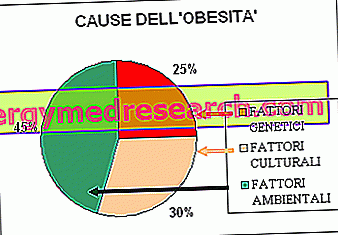The importance of genetics in the development of obesity and overweight
THE CAUSES OF OBESITY
Complex genetic factors account for about 25% in the development of obesity, transmissible cultural factors contribute 30% and the remaining 45% is given by non-communicable factors that are acquired during life.

GENETIC FACTORS
CONTRIBUTION OF BREEDING FACTORS: significantly greater prevalence (50%) of obesity (BMI> 30%) among black women compared to white women
There is a gene classified as "GENE OB" responsible for the synthesis of a protein hormone (leptin) that acts at the hypothalamic level, determining the sense of satiety. This hormone is able to indirectly regulate the caloric intake so as to maintain fat deposits normally. A lean individual will therefore produce higher amounts of this hormone (or will be more sensitive to his action) than an overweight individual (who often produces similar or even higher amounts but is less sensitive).
A defect in the production of this protein, or the lack of receptors in the brain, drives the individual in search of food and, by reducing the body's metabolism, promotes the development of obesity.
There are additional chemicals and hormones that may or may not promote the development of obesity. Some of these substances have been and still are used in the medical and pharmaceutical fields to combat this major social problem. However, the abuse of some medicines has serious side effects, often at cardiac level. The use of drugs of this type should therefore be done only in extreme situations and under medical supervision.
CONCLUSIONS: IT IS DIFFICULT TO THINK THAT HUMAN GENETIC HERITAGE IS CHANGED IN A CONSIDERABLE WAY IN THE LAST YEARS. THE EXPOSED INCREASE OF OVERWEIGHT AND OBESITY IN INDUSTRIALIZED COUNTRIES IS THEREFORE TO RECOVER AT A CHANGE IN FOOD HABITS.
CULTURAL FACTORS:
Studies have shown a high correlation between obesity and disadvantaged socio-economic conditions, as well as between excess weight and low levels of education.
Among the adults of medium-high study (diploma or degree) the percentage of obese is equal to 4.5% while it rises to 15% among adults with at most the elementary license or no degree. The phenomenon mostly involves the fairer sex, so much so that a woman with low educational qualifications has a chance of becoming obese 3-4 times higher than her high school graduate or graduate.
They are therefore the most educated and aware segments of the Italian population to better defend themselves from obesity and overweight.
ENVIRONMENTAL FACTORS:
Environmental factors affect everything the individual interacts with, including eating and motor habits. Thus the wrong lifestyle is the first and most important cause of obesity in industrialized countries. Lifestyle that often leads the individual to adopt incorrect eating habits and reduce physical activity.



